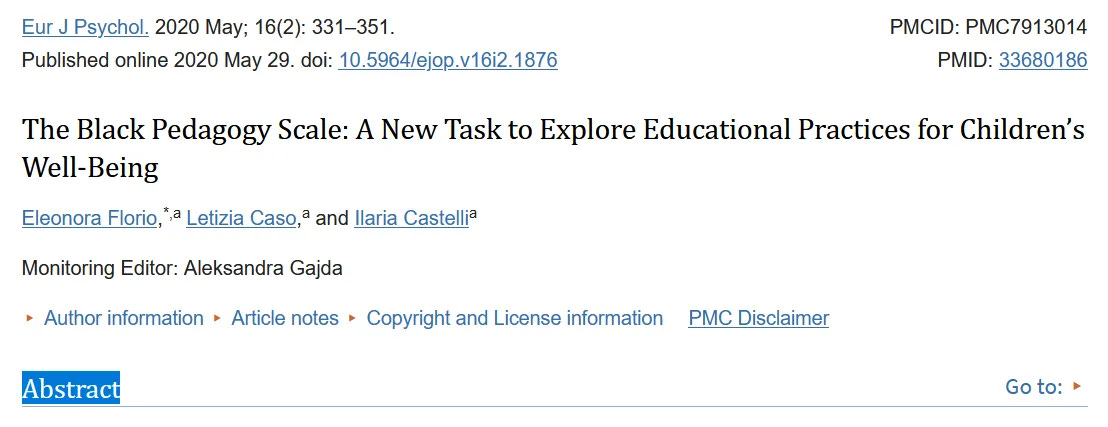Black pedagogy - PART 4 : Goals and Methods in Black Pedagogy / Bachelor Thesis, 2012.
And : The Black Pedagogy Scale : A New Task to Explore Educational Practices for Children`s Well-Being.
The Black Pedagogy Scale: A New Task to Explore Educational Practices for Children’s Well-Being
( … )
The present contribute focuses on the concept of “Black Pedagogy” (Rutschky, 1977; ISBN: 3548356702), meant as a set of educational practices assimilable into those that nowadays are included in the frame of physical and psychological maltreatment (e.g., corporal punishment, frightening children, etc.). The purpose of this work is to present our operationalization proposal of the concept and the results deriving from a first validation of the “Black Pedagogy Scale”.
( … )
Furthermore, even if our results suggest that physically maltreating educational practices of Black Pedagogy are not accepted nowadays, the same cannot be said for the educational values and objectives from which such practices consistently originated. The ongoing diffusion of the subtlest forms of disciplinary methods that are definable as psychologically harmful could be therefore due to the persistence of an obsolete hierarchical and authoritarian conception of the right way to raise and educate children. Nowadays, the threshold of “acceptable” mental or physical violence in an educational relationship seems to be lower than in the past, but the impression is that not all forms of violence are subjected to the same rate of decrease in their use.
( … )
Full article / Study :
https://www.ncbi.nlm.nih.gov/pmc/articles/PMC7913014/
…………………………………………………………………………………………………………………………
Goals and Methods in Black Pedagogy
Bachelor Thesis, 2012
50 Pages, Grade: 2,7
In this work, the so-called black pedagogy is addressed from a historical perspective. The focus is particularly on the goals of black pedagogy and the methods used to achieve these goals. The interest guiding knowledge also includes the question of the concept of black pedagogy. To what extent is it appropriate and up-to-date? Can the term be used when talking about historical events and educational ideals? The knowledge-guiding interest is pursued through the intensive discussion of the source texts and the question of the topicality of the topic.
The consideration of the topic is limited to the 16th/17th century until about 1950 in Germany. The focus is on the 18th and 19th centuries and above all on the age of enlightenment. For this reason, source texts from this period were primarily edited. The topics of home education and abuse of children, on the other hand, were left out, as they go beyond the topic.
The work begins with a definitional approach from different perspectives, since the understanding of concepts is an important prerequisite for the further understanding of the work. Afterwards, the historical development is described in detail and two educators are introduced, who are considered representatives of black pedagogy. Furthermore, basics are presented, which were invoked in black pedagogy. Afterwards, the image of man is presented, which prevailed in black pedagogy. The main part of the work is the elaboration of the goals that black pedagogy pursues and the methods by which the goals should be implemented. Finally, possible consequences are described, alternatives to black pedagogy are named and the topicality of the topic is considered. In the outlook, it will be critically discussed to what extent the term black pedagogy can be used.
Table of contents
1. Introduction
2. Definitional approaches to the concept of black pedagogy
2.1. Definitional approach according to Katharina Rutschky
2.2. Definitional approach to Alice Miller
2.3. Further definitional approaches
2.4. Own definition
3. Historical development of black pedagogy
3.1. Development
3.2. Representatives of black pedagogy
3.2.1. Dr. Daniel Gottlob Moritz Schreber
3.2.2. Johanna Haarer
3.3. Fundamentals of black pedagogy
4. Image of man
4.1. The image of the adult
4.2. The image of the child
4.3. The image of the educator
4.4. Summary and conclusion
5. Goals of black pedagogy
5.1. Subordination among adults
5.2. Education in civic virtues
5.2.1. Order
5.2.2. Gratitude
5.2.3. Honesty
5.2.4. Obedience
5.2.5. Diligence
5.2.6. Modesty
5.2.7. Chastity
5.3. The conditioning to the non-memorization of the children
5.4. Summary and conclusion
6. Methods in black pedagogy
6.1. Physical violence
6.2. Deterrence and anxiety
6.3. Lies
6.4. Punishment and reward
6.5. Denial of basic needs and hardening
6.6. Deprivation of love
6.7. Manipulation
6.8. Control and exercise of power
6.9. Humiliation
6.10. Summary and conclusion
7. Consequences of black pedagogy
8. Alternatives to black pedagogy
8.1. "White pedagogy"
8.2. Anti-pedagogy
8.3. Reform pedagogy
9. Conclusion and outlook
9.1. Summary of work
9.2. Black pedagogy from the perspective of the present
9.3. Conclusion
9.4 Outlook
10. Bibliography
( … )
https://www.grin.com/document/1177347
…………………………………………………………………………………………………………………………
This chapter is part of a book that is no longer available to purchase from Cambridge Core
Black Pedagogy
If the Kurrent penmanship intimates the personalized gesture within an abstracted system of writing and thinking, it also indicates the larger educational structures that attempted to produce similar (even uniform) individuals beholden to certain moral codes and models of development. In the film, Haneke examines educational institutions and methods of child-rearing belonging to a long Western tradition that was thoroughly criticized in post-1968 Germany. In doing so, he makes direct use of the aforementioned work of the critic Katharina Rutschky (1941–2010). In 1977 Rutschky, part of the generation invested in unmasking authoritarian practices in everyday life, published her book Schwarze Pädagogik: Quellen zur Naturgeschichte der bürgerlichen Erziehung (Black Pedagogy: Sources for the Natural History of Bourgeois Education), a compendium of eighteenth-, nineteenth-, and twentieth-century texts on “Erziehung,” the difficult-to-translate noun meaning schooling, child-rearing, upbringing, disciplining, formation. Employing the caustic designation “black pedagogy” in her title, Rutschky reveals the pernicious side of Enlightenment pedagogy with her polemically chosen excerpts from various treatises espousing reform. These include works by famed pedagogues Campe, Basedow, and Pestalozzi, psychological studies, serial novels, handbooks, and manuals. Taking her cue from Norbert Elias's magisterial On the Process of Civilization (1939, republished 1969) and Philippe Ariès's Centuries of Childhood: A Social History of Family Life (1960), Rutschky demonstrates how emotional and ideological continuities in Erziehung continue well beyond the “pedagogical century,” the name given the eighteenth century with its Rousseauian inclinations and efforts to make pedagogy a public rather than a private matter. Historical drawings in her six-hundred-page compendium show strange devices to improve posture, architecture for teacher-centered instruction (Frontalunterricht), and climbing equipment to strengthen and discipline young bodies. In Rutschky's view, the discovery of the child within the family unit goes hand in hand with efforts to internalize authority and subjugate children under duplicitous pretenses. She impugns viewing childhood as an incubation period, for it facilitates the concept that teachers need “total access” (Zugriff) to the child. The youngster becomes a “blank space, a tabula rasa, which every pedagogue desires in order to more easily inscribe himself on it.” Such a system propagates itself, churning out more pedagogues who reproduce the institutions that have created them. Child-rearing and disciplining practices (Erziehung) first supplement and then displace education (Bildung), which is interested more in the transmission of knowledge and the full unfolding of an individual's capacities.
………………………………………………………………………………………………………………………….





